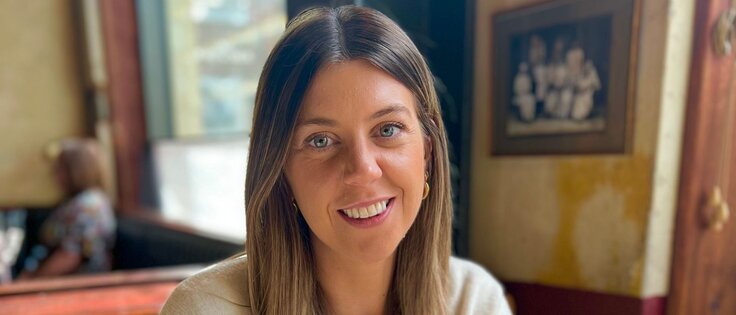
Article
8 min read
How Dishoom dishes up the industry standard for staff retention
Kitty Finstad
Jan 29, 2024
Chapters

Kate Moscardini, Dishoom. Copyright Dishoom 2024
After posting record profits in 2022, Dishoom’s UK collection of Bombay-style cafés continues to set high standards for its big-hearted, people-centric team culture. It’s one of the reasons Glassdoor named it the best hospitality company to work for two years in a row (2022-2023). And why the brand reported hundreds of internal promotions in 2023 – retaining staff is, it seems, as natural as filling tables. From the brand’s busy, buzzy Shoreditch location, Kitty Finstad spoke to Dishoom’s Head of People, Kate Moscardini, about warm welcomes, strong leaders and the importance of chatting over chai.
Meet the team
Who: Kate Moscardini
Role: Head of People
Business: Dishoom
Where: Birmingham, Edinburgh, Manchester and London
Starting as you mean to go on
Wow, it’s busy in here! And every member of the team has a smile on their face. What’s your secret?
It’s no secret – it’s all about the team journey. It’s as important as our customer journey, and how that journey starts even before people start working with us. It’s about brand, storytelling and showing people what it’s like to work at Dishoom. Recruitment takes place in the cafés so candidates can get a feel for the culture and the people that make it up.
I've heard about the importance of the first week…
As soon as someone arrives, they meet what we call a Welcome-walla – there’s one in every café – who stays with them and makes sure all the basic questions are answered in that first week. Where do I go at lunchtime? Where do I put my stuff? Where do I find my rota? How do I book holidays? That core onboarding, alongside on-the-job training, is totally nailed in that first week – the first three days, really. That time is a critical settling-in period.
How does that positive start evolve into a long-lasting, nurtured relationship?
Our culture – guided by seva, a Hindu word meaning “selfless service” – feeds it. At Dishoom, seva translates to “big-hearted and first-class” – values that are embodied in every single thing we do. In how managers interact, how they build relationships with their teams… and the longevity of our managers is a real testament to the strength of our culture – most of them have been here a really long time. My team take those relationships above the normal, above just making sure that rotas are fair, and people are taking breaks. They act as partners to make sure that operationally people are happy.
Building on culture (and data)
There’s a strong human element at play here, but what role does data play in a business the size of Dishoom?
Huge! We use data to guide and support us in having the right conversations. My team use data to find common connections to get the best out of all the teams. For example, data can tell us that when people have more flexibility, they often are more engaged and stay with us longer. We always try to deepen our knowledge of the team, especially now that expectations are so different from the era of full-on, full-time roles where you people would work all the hours under the sun and leave exhausted at the end of their shifts.
How are things different now, in the post-pandemic world? And how are you responding to a new generation’s attitudes expectations about work?
One thing we’ve really looked hard at is how to make closing as efficient as possible. How do we make sure the team feels safe getting home at night? Safety is a such a big thing in this industry. So we look closely at how we rota and how we do breaks. And y’know, we don’t always get it right – the cafés are always mad busy and taking breaks isn’t always the easiest. But it is absolutely a front-and-centre focus for leadership. And we’re lucky that everyone on our board really cares about people and the importance of culture.
Culture evolves, of course, but it needs leadership to invest in initiatives that feed it. What’s on the menu?
For one thing, we have a really strong learning team. Loads of e-content, and lots of face-to- face sessions too. Our managers are called babus and they run babu masterclasses, which are all about developing potential managers. But I think the real strength, and one of the things that makes Dishoom different, is that we’re founder-led [by cousins Shamil and Kavi Thakrar,]. The founders still see every new starter within their settling-in period – they live and breathe the brand.
Progressing careers to keep staff invested
Dishoom’s service-recognition incentives have achieved near legendary status in the hospitality industry...
After five years at Dishoom, everyone goes to Bombay to see first-hand the origins of the brand – the inclusive culture of Bombay’s early 20th century Irani cafés, where all people were welcome. And people buy into the culture because it’s so authentic – that goes for everyone who works here and every guest who comes to eat and drink here. Every single detail in the décor of the restaurants has been thought of.
The clock in Dishoom at King’s Cross looks exactly like one you might pass in Bombay. The volume of the music in each location is a decision that’s really obsessed over, and it’s those core cultural details that influence how people feel when they come here to eat or to work.
Sounds like that obsession is infectious when it comes to career progression at Dishoom…another reason why people stick around so long?
For sure. a lot of our senior team have been internally promoted. We invest in developing people. We do the basics well and look at how we deliver benefits, make them a bit different from everyone else. How do we keep up to date and make sure we’re not just doing the same old, same old just because that’s the way we’ve always done it. Like right now, we’re looking at our onboarding handbook. It’s a big thing to change – around 90 pages – but it doesn’t look and feel like us anymore.
Shifting with the workforce's needs
Responding to change is a big theme in hospitality right now. The entire industry has shifted, and the expectations of workers entering it are completely different.
Totally. Talent then didn’t ask for or expect the love and attention that we give now. They just got on with things and you had lots of good, experienced people in the talent pool. Like today, retention a decade ago was a big issue too, but the reasons were different. Now, expectations have shifted and if you as an employer don’t meet those expectations, people will leave. Simple as that. Turnover is still an issue – that’s the nature of some hospitality roles – so we really focus on that big-hearted start and delivering that through every Dishoom journey.
So what’s the Dishoom way now?
Super simple things like making sure people get the right breaks, that their pay is fair. If we can make their working week easier, we do what we can. We encourage good wellbeing through our initiatives, looking at mental, physical, financial and social wellbeing and how we can make a difference in each of these areas. We conduct employee engagement surveys in each café, but not in a standard way – it’s when we feel it’s the right time for that café. Most important is making sure people feel supported by their manager. That means having conversations. Like our seva chats, which are mainly about performance. And then we have frequent chai chats, which are not at all formal and which are just about checking in and asking, ‘How are you doing?’ It all comes back seva – being big-hearted and first-class.
Believe in that and it comes through in everything you do.
